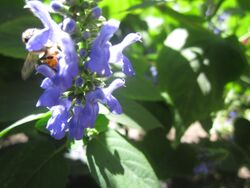Biology:Salvia polystachya
| Salvia polystachya | |
|---|---|

| |
| Scientific classification | |
| Kingdom: | Plantae |
| Clade: | Tracheophytes |
| Clade: | Angiosperms |
| Clade: | Eudicots |
| Clade: | Asterids |
| Order: | Lamiales |
| Family: | Lamiaceae |
| Genus: | Salvia |
| Species: | S. polystachya
|
| Binomial name | |
| Salvia polystachya Ortega
| |
Salvia polystachya is a herbaceous perennial native to central Mexico and south into Guatemala and Panama, typically growing at elevations from 5,000 to 10,000 feet in mild climates where there is some summer rain. It one of the species used as chia[1][2] and it is rarely seen in horticulture.[3]
Salvia polystachya grows up to 3–9 feet in one season, preferring the shelter of other plants because the stems become very brittle. It blooms in late summer or early fall, with .5 inch flowers that are violet-blue at the edge and fading to white at the center. Many short and slender spikes with verticils of tightly held flowers give the plant its specific epithet polystacha. The leaves are yellow-green, 1 inch long and wide, and grow in small clusters.[3]
From the aerial parts of Salvia polystachya five neo-clerodane diterpenoids, polystachynes A-E, have been isolated. The structures were established by spectroscopic methods. Other clerodanes such as salvifaricin, linearolactone and dehydrokerlin were also isolated.[4]
References
- ↑ Whistler, Roy L. (1982). "Industrial Gums from Plants: Guar and Chia". Economic Botany 36 (2): 195–202. ISSN 0013-0001. https://www.jstor.org/stable/4254374.
- ↑ Calzada, Fernando; Yepez-Mulia, Lilian; Tapia-Contreras, Amparo; Bautista, Elihú; Maldonado, Emma; Ortega, Alfredo (May 2010). "Evaluation of the antiprotozoal activity of neo-clerodane type diterpenes from Salvia polystachya against Entamoeba histolytica and Giardia lamblia: Antiprotozoal Activity of Neo-Clerodane Type Diterpenes from Salvia Polystachya" (in en). Phytotherapy Research 24 (5): 662–665. doi:10.1002/ptr.2938. https://onlinelibrary.wiley.com/doi/10.1002/ptr.2938.
- ↑ 3.0 3.1 Clebsch, Betsy; Barner, Carol D. (2003). The New Book of Salvias. Timber Press. p. 225. ISBN 978-0-88192-560-9. https://books.google.com/books?id=NM0iwB8GrQYC&pg=PA225.
- ↑ Maldonado and Ortega. Polystachynes A-E, five cis-neo-clerodane diterpenoids from Salvia polystachya. Phytochemistry (2000). 53, 103-109
Wikidata ☰ Q5224519 entry
 |


